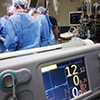A Hospital Management System (HMS) offers the benefit of real-time insights and reports on a hospital's performance and outcomes. Additionally, it aids in resource allocation, planning, budgeting, risk management, quality improvement,
and more. By optimizing processes, reducing costs, increasing revenue, and attracting and retaining customers, an HMS can also improve the profitability and competitiveness of the hospital.
Notably, stakeholders may not use every component or module of an HMS, instead choosing specific ones to streamline their day-to-day responsibilities.
To gain a better understanding, let us delve into the various significant components and modules that comprise a Hospital Management System.
The key ingredients that constitute a Hospital Management System
Within an HMS, every module or component has a designated purpose and role in supporting the daily functions of a hospital. Among the frequently utilized components are
1. Appointment Management
For hospitals to operate efficiently, a convenient and streamlined process for scheduling appointments is essential. Utilizing the appointment management module, patients can easily schedule, modify, or cancel their appointments online, which aligns their specific needs with the appropriate physician. This approach provides greater flexibility and convenience for patients, while reducing the number of missed appointments and allowing doctors to optimize their schedules for greater efficiency.
2. Patient Record Management
This component is responsible for storing and managing all patient-related information, such as their medical history, diagnosis, treatment, and medication, in a structured and organized manner. It benefits both patients and doctors by providing easy access to historical medical information, which can provide insights into how to improve the patient's health or manage their ailments in the future.
3. Clinical Workflow
In order to maintain consistency, it is essential for all software to adhere to a designated workflow from the initial stages of creation through approval and archival. The clinical workflow element plays a pivotal role in outlining the various clinical procedures and processes that occur within the hospital, effectively designing the patient-hospital relationship. Such procedures may involve documenting the admission, discharge, transfer, and referral of patients, while also incorporating alerts and reminders for critical events or actions.
4. Staff Management
The information pertaining to the qualifications, roles, responsibilities, schedules, and payroll of the staff is managed by this component. Moreover, it enhances communication and coordination amongst the staff members. This results in reducing their workload and stress, while simultaneously increasing the efficiency and productivity of the hospital administrators or management.
5. Billing and Insurance
The hospital's billing and invoicing component not only generates bills and invoices for the services offered, but also manages insurance claims and reimbursements. Its advantages include offering patients transparent and accurate billing information, as well as aiding hospital administrators or management in increasing revenue and lowering expenses.
6. Inventory Management
The management component of this system is responsible for overseeing and maintaining inventory of medical equipment, supplies, drugs, and other resources, ensuring that they are utilized optimally and remain available. By providing necessary resources to healthcare providers and reducing waste and losses, this component benefits both providers and hospital administrators alike.
7. Supply Chain Management
Managing the procurement, distribution, storage, and disposal of medical materials and goods while coordinating with suppliers, vendors, and distributors, is the role of this component. By ensuring the timely and quality delivery of supplies, it benefits healthcare providers. Hospital administrators or management benefit by optimizing the performance of the supply chain and minimizing risks.
8. Financial Management
The financial component of the hospital is responsible for managing all financial transactions and records. Additionally, it is equipped with financial analysis and reporting tools that offer valuable insights and guidance to hospital administrators and management. As a result, decision-making and planning become more informed and strategic, benefiting the hospital's overall financial health.
9. Reporting and Analytics
By furnishing hospital administrators and management with an abundance of data exploration and discovery tools, along with a suite of various reports and dashboards on hospital performance and outcomes, this component confers benefits that are both actionable and intelligent. By doing so, it furnishes strategic development and quality improvement insights that enable healthcare professionals to deliver the highest levels of patient care.
Things to Consider When Selecting a Hospital Management System
The decision to choose or construct a Hospital Management System (HMS) holds great significance for your healthcare facility. Its selection can impact the caliber and productivity of your medical services and can influence the contentment and commitment of both your patients and staff. Therefore, a comprehensive evaluation of all potential factors should be taken into account before deciding on an HMS that aligns with your requirements and aspirations.
1. Must be rich in features/Capabilities
The HMS should have all the features and functions that you require for your hospital operations. You should identify your current and future needs, gaps, and opportunities and evaluate the available options and solutions in the market. You should also consider the compatibility and integration of the HMS with your existing systems and devices, including healthcare security systems, employee communications platforms and building management tools.
2. It should be user-friendly
The HMS must offer an uncomplicated and user-friendly experience for staff and patients alike. The interface and design should be intuitive, with instructions and guidance that are straightforward and easy to comprehend. Adequate training and support materials must be available to enable users to master the system. Furthermore, the learning curve should be gradual to ensure that any user can proficiently utilize the system.
3. Must be easily scalable
To support the growth and expansion of your hospital, it's crucial that the HMS you choose has the capability to manage the ever-increasing volume and complexity of data and transactions, and can also cater to the evolving needs and expectations of your customers and stakeholders. Additionally, the HMS should possess the ability to embrace and incorporate new technologies and innovations, whilst being flexible and adaptable in its approach.
4. It should have maximum uptime
The HMS must function with unwavering consistency and precision, free from any mishaps or malfunctions. Added bonus points if it is capable of providing uninterrupted service for extended periods of time, with minimal interruptions required for maintenance or other issues. In the event of any unforeseen downtimes, it is essential that the system vendor possesses the ability to rapidly execute a recovery process and restore system access without delay. Lastly, it is imperative that the HMS is equipped with a backup and disaster recovery system to prevent any potential system failures or disasters.
5. Should be high on security
Patient healthcare data is of utmost importance and requires the highest level of protection. The hospital management system (HMS) must have the capability to safeguard patient data and confidential administrative information from any possible unauthorized access or breaches. Moreover, it is imperative that the system adheres to all applicable laws and regulations governing user data privacy and security, including HIPAA, GDPR, and other similar regulations. To ensure the utmost level of security, the HMS must be equipped with encryption, authentication, authorization, and auditing mechanisms to maintain data integrity and security.
6. It should be affordable
To ensure that the HMS fits your financial capabilities, it should be both affordable and fall within your budgetary constraints. In addition to this, it is important that the pricing structure and payment terms are clear and predictable. A crucial factor in achieving a positive ROI from implementing the HMS is ensuring that it requires minimal hardware investment and maintenance, thus making it low maintenance. The optimal option for an HMS would be one that is cloud-based.
When it comes to selecting or creating an HMS for your hospital, there are several key factors to take into account. By carefully considering these factors, you can find or design an HMS that fully satisfies your needs and objectives, while also boosting your overall performance and results.




Leave a reply